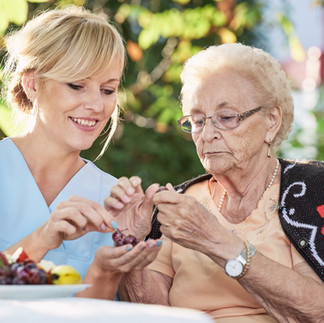Introduction
Life has a way of throwing challenges our way, be it personal or job-related. During these times, it's not uncommon to feel like you're struggling to keep your own head above water. But even when you're enduring personal hardships or waiting for a much-needed blessing, there's a powerful way to find solace and purpose by giving to others. In this blog post, we'll explore the art of giving, even when you are waiting for your own blessings to arrive.
Self-Care as the Foundation
Before we delve into the art of giving during difficult times, it's essential to emphasize the importance of self-care. You can't pour from an empty cup, and it's okay to take care of yourself first. When you're facing personal or job-related challenges, self-care is not selfish; it's a necessity.
Take time to reflect, heal, and find your own balance. Only when you're in a relatively stable emotional and mental state can you extend a helping hand to others effectively. Remember:
Self-care is the essential foundation for effective giving during personal or job-related challenges, preventing burnout and enhancing empathy.
Research shows that acts of kindness and giving have a positive impact on mental and physical health, foster social connections, and provide a sense of purpose.
Engaging in giving can create a cycle of positivity, where the goodwill you put into the world often finds its way back to you, even when you're facing personal hardships.
Small Acts of Kindness
Giving doesn't always necessitate grand gestures. Even small acts of kindness can have a profound impact on those in need. Personally, I've discovered that redirecting my focus from negative thoughts or feelings of lack to the well-being of others is a powerful way to uplift my spirits. Here are some simple ways to brighten someone's day, regardless of your own circumstances:
Small Acts Express your gratitude by acknowledging something that someone values. It can be as simple as saying, "Thank you for taking the time to load the dishwasher in the break room." Or you can show appreciation by saying, "I wanted to express my gratitude for your consistent feedback; it's incredibly valuable." Small gestures like these can make a big difference in recognizing and thanking someone for their contributions.
Random Acts of Kindness Surprise a colleague with their favorite coffee or leave an uplifting note on a friend's desk. These small gestures can bring joy to someone's life.
Volunteer Dedicate your time or skills to a cause you're passionate about. Assisting others not only fosters a sense of fulfillment but also forges deeper connections, even when facing personal challenges.
Listening Sometimes, the greatest gift you can offer is a listening ear. Be there for a friend or colleague who needs to talk, vent, or simply feel heard.
Reaching Out Connecting with others who may be going through similar situations can be a source of wisdom and a way to gather valuable insights to apply in your own life.
On a personal note, in my blog, I often explore topics that may include personal struggles. By infusing these posts with research and examples that have aided me in such situations, I aim to educate and inspire my readers without taking a preachy stance. The power of vulnerability and sharing one's journey is that you never know who might read your words and find solace, especially when you use your experiences to uplift and connect with others while transcending your own challenges. Which segues right into the next topic.
Share Your Journey

Sharing your own struggles and challenges with others can be a powerful form of giving, akin to offering a lifeline to a tired soul. The act of opening up fosters empathy and understanding, creating a safe haven where individuals can unburden their hearts. Encouragement,
in the form of shared experiences, has proven to be remarkably effective. Statistics show that individuals who receive encouragement are more likely to persevere and find renewed strength. For instance, a study conducted by Stanford University found that students who received words of encouragement from their peers saw a 35% increase in their motivation to overcome academic challenges. Real-world examples abound, from the mentor who shared their personal struggles, motivating their protege to thrive, to the support group where individuals, by sharing their own journeys, discovered newfound resilience. Such acts of giving not only inspire but also build a stronger sense of community, where mutual support becomes the cornerstone of strength and perseverance.
Pay It Forward
The idea of "paying it forward" is a beautiful concept that revolves around performing acts of kindness for others without anticipating any immediate reciprocity. It's a way to set in motion a ripple effect of goodwill, both in personal and business life. Even when you find yourself waiting for your own blessings, you have the power to initiate this chain of positivity.
The concept of "paying it forward" has ancient roots in various cultures and religions, emphasizing kindness and goodwill without expecting reciprocity. The modern expression of paying it forward gained prominence through the 2000 film "Pay It Forward," based on Catherine Ryan Hyde's novel. This idea encourages individuals to perform acts of kindness with the belief that these actions can set off a chain reaction, promoting a more compassionate and interconnected society. It's a concept that transcends time and culture, focusing on the simple yet powerful act of spreading kindness to others, expecting nothing in return.
For instance, in your personal life, a small gesture like paying for a stranger's meal at a restaurant can light up their day and leave a lasting impact. Likewise, leaving a heartfelt note of encouragement for a friend, colleague, or even a family member can serve as a beacon of hope in their life. The beauty of these actions lies in the fact that their positive energy tends to reverberate through the universe, finding its way back to you when you least expect it. It's not merely a random act of kindness; it's an investment in the collective well-being of the world, where every small deed contributes to the greater good. This virtuous cycle of kindness, in both personal and business contexts, is a testament to the enduring power of human connection and compassion.
The Power of Gratitude
In challenging times, cultivating gratitude can be a powerful source of comfort and connection. It's not always easy to feel grateful, but even amidst difficulties, the act of practicing gratitude can be profound. When you express gratitude, you take a moment to acknowledge the blessings in your life, regardless of their size. It's about recognizing the goodness that surrounds you, no matter how modest it may appear.

To show gratitude, consider expressing it through simple yet impactful actions like sharing heartfelt thank-you notes, offering a helping hand to someone in need, or engaging in the practice of journaling. In fact, statistics show that journaling can significantly lift one's spirits. According to a study from the University of California, individuals who maintained a gratitude journal reported feeling 25% happier and more optimistic. By practicing gratitude, you not only uplift your own spirits but also spread positivity to those in your circle, making it a gift that keeps on giving.
Conclusion
The art of giving, even when enduring personal or job-related challenges, giving is a beautiful way to find purpose and make a positive impact in the world. Remember that you don't have to wait for your own blessings to bless others. By embracing self-care, practicing small acts of kindness, sharing your journey, paying it forward, and cultivating gratitude, you can create a cycle of positivity that transcends your own struggles and blesses the lives of those around you.




















Comments